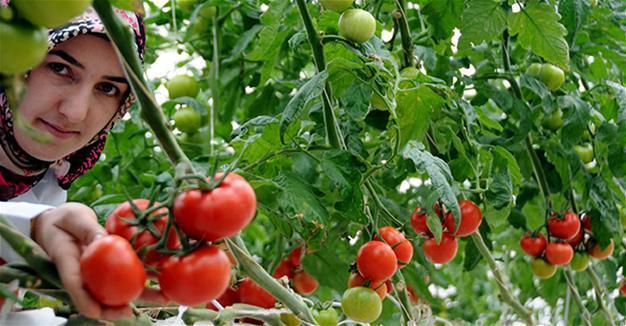Turkish agribusinesses lose $425 million due to continuing Russian sanctions
ANKARA – Anadolu Agency

Russia is gradually abandoning economic sanctions on several Turkish goods, but some agricultural products with a total market share of $425 million remain on the black list, according to data gathered by Anadolu Agency.
Moscow recently lifted the ban on the import of onions, cloves, salt, cauliflower, broccoli and gum from Turkey, but the sanctions on items such as tomatoes or grapes have remained.
Moscow imposed sanctions on Jan. 1, 2016, following the downing of a Russian war plane for violating Turkish airspace. The incident touched off months of diplomatic tension that began abating with a normalization process last summer.
The initial ban included imports of tomatoes, oranges, apples, apricots, cabbages, salt, broccoli, mandarin oranges, cucumbers, pears, peaches, plums, strawberries, onions, carnations and poultry.
Thanks to the normalization of relations, the ban on oranges, mandarin oranges, apricots, peaches and plums was lifted on Oct. 9, 2016, by a government decision.
During Turkish President Recep Tayyip Erdoğan’s visit to Russia last week, the ban on onions, carnations, salt, cauliflower, broccoli and gum imports was also lifted.
In 2015, Turkey sold $3.4 million in carnations, $3.2 million in salt, $8.7 million in onions, $574,000 in cauliflower and $2.4 million in chewing gum to Russia.
Turkey’s largest onion and cauliflower market is Russia, while Georgia is the top broccoli buyer and the Netherlands imports the most carnations from Turkey.
Despite the end to the trade barrier, export figures have failed to reach their previous level.
On the other hand, Russia continues to ban poultry, tomatoes, cucumbers, pickles, grapes, apples, pears and strawberries from Turkey.
The total value of these exports to Russia exceeded $425 million in 2015.
The export of tomatoes earned Turkey $258.8 million in 2015, while grape exports brought in $97.6 million.
The value of other products that Turkish exporters cannot sell to Russia is calculated at $8 million for chicken, $655,000 for turkey, $27 million for cucumbers, $13 million for apples, $3 million for pears and $17 million for strawberries.
Russian agricultural watchdog Rosselkhoznadzor does not plan to lift the restrictions on the remaining agricultural products from Turkey in the near future, state news agency TASS reported on March 10.
“Those restrictions that have been … remain. So far we do not plan to lift them. Definitely not in the near future,” said the watchdog’s official representative, Yulia Melano, as quoted by TASS.
 Russia is gradually abandoning economic sanctions on several Turkish goods, but some agricultural products with a total market share of $425 million remain on the black list, according to data gathered by Anadolu Agency.
Russia is gradually abandoning economic sanctions on several Turkish goods, but some agricultural products with a total market share of $425 million remain on the black list, according to data gathered by Anadolu Agency.